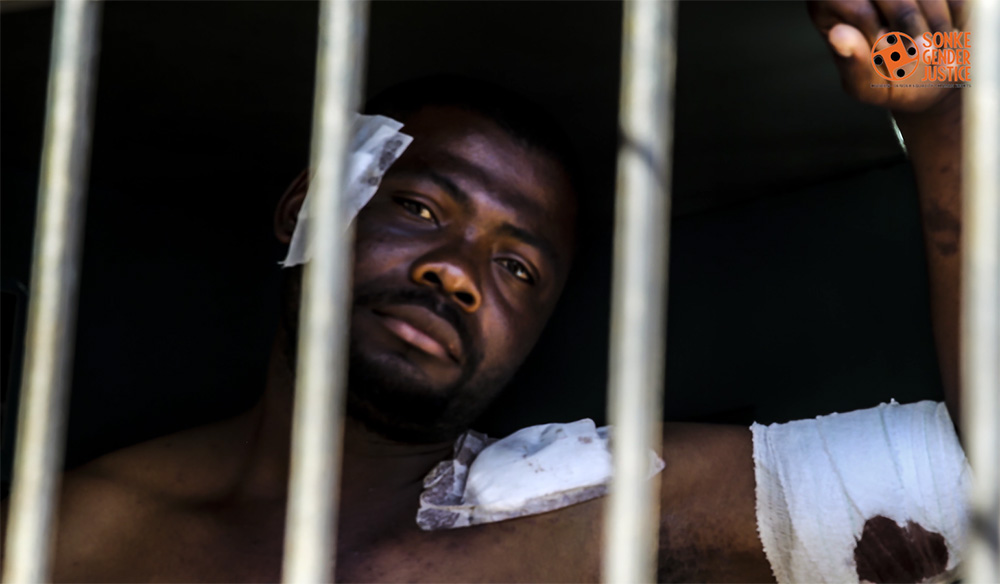He approached us with a sneer and simmering anger, asking why we were in “his territory.”
Armed only with my camera, I stared at him in surprise. I have never been asked a question with such malice before. “I am just taking pictures. Is there a problem?” I replied.
“I will smash your face through that camera,” he said with his hands reaching towards me. I stepped out of the way and glanced at the car revving a few meters from the unexpected confrontation.
I noticed that the four foreign national men sitting in the vehicle, who had the courage to accompany me to the township of Nomzamo in Strand, Cape Town, were visibly shaken. They were yelling at me to get into the car before the man followed through on his threat.
Fighting back tears, Lionnel Drench, a 29 year-old foreign national who had fled Congo Brazzaville for a better life in South Africa explained to me why he was so shaken.
“He looks like one of the men who killed my brother,” he said.
Normally I would have stood my ground. But now, standing on the washed-out blood stain where Lionnel’s brother Massiossio Souka Hoven Romeld had died two days previously, I got into the car.
Lionnel, 40, was the eldest of several children who migrated to South Africa to escape the harsh realities of his country. He owned a welding business operating out of a shipping container in the volatile Cape Town township. He worked hard to feed his three children who remained in Congo Brazzaville.
On February 25, 2017 Massiossio was brutally stabbed to death by four men wielding pocket knives. His only crime was walking home after a long day of work.
Without access to counselling, Lionnel was struggling to process the chain of events that had led to his brother’s untimely death. Fearing for his own life, he was surrounded by men from his hometown for protection.
Amidst the resident’s chants urging the attackers to finish-off the “kwere kweres” (outcasts), Lionnel held his brother in his arms. He’d been stabbed several times by the same men but could not feel his wounds. His concern was for Massiossio, whose life was slipping away.
“Our attackers did not demand cellphones, jewelry or money. They just attacked us. I can remember, when the men were driving their knives into us, we became so paralysed with shock that we could not defend ourselves. One of the men plunged his knife straight into my brother’s heart. They stabbed everywhere,” said Lionnel.
He continued: “They treated us like animals that can be slaughtered. We are not animals, we are people. They are cruel. I have lost my brother and for what? All we did wrong was walk home from a long day of work.”
His brother’s South African wife, Souka Sophia, fled their home after the incident. She has not returned.
In the same week in Site C Khayelitsha, a Somali shopkeeper was shot dead in a suspected robbery, reported the Cape Times. This brought the number of known deaths of foreign business owners in South Africa during the month of February, to five.
Xenowatch statistics have indicated that there had been more than 66 deaths, assaults on at least 116 people and 11 140 people have been displaced in xenophobic attacks since the start of January 2015.
Rosettenville, Pretoria West, Arreridgeville, Lotus Gardens and Mamelodi have been hard hit with more than 60 foreign nationals and South Africans victimised in February 2017.
“Imagine killing a person, a human being who was begging for them to spare his life,” asks senior trainer at Sonke Gender Justice, Micheline Minani. “This was the case for Lionnel and Massiossio. Lionnel is afraid of taking the case to court because he does not have protection.” Minani argues that the South African justice system and police need to classify xenophobia as a hate crime.
“Hate is what attackers use to fuel their actions. They would say: ‘what are you doing in my country? Go back before we kill you all.’ That is a hate crime,” she said.
Police have arrested one man in connection with Massiossio’s murder. Three more suspects are still at large.
Watch the video here.








